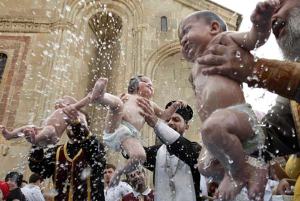In my last series (see part III of III here) I talked about how persons of the Reformed tradition – and Baptists can be included here – have a different view of what baptism (and the Lord’s Supper) is and does because they have a different view of Christology.
But why do the Reformed read the Scriptures in such a way so as to preclude the Lutheran – which I submit is the Biblical – view of the sacraments and Christology?
I recently came across two articles (see here and here) that posit answers to that question, and a common theme through both of them is the philosopher Plato – in other words, Platonic philosophy.
In other words, the idea is that whether or not those of the Reformed persuasion realize it, their theology has been significantly influenced by ideas that Plato and his followers had.
Let’s look a little closer. In the first blog post, the Lutheran pastor Matt Richard provides us with a simple definition of Platonism:
“Platonism comes from the Greek philosopher named Plato. Very simplistically, Plato saw our existence in two different spheres or realms. He held to the material realm and the transcendent realm of forms. To Plato the transcendental realm was right, true, and perfect, but the material realm was changing, flawed, and a mere shadow. Thus, Plato taught that it was the goal of a man to escape his evil and flawed body. According to Plato, the soul was good; material was bad.”
The second blog post, from the Lutheran Pastor Mark Surburg, provides a little more nuance here: “Plato’s thought is complex, and we should be cautious that we don’t turn Plato himself into a true Gnostic who rejected the material world as evil” (“See Timaeus 29-30 for positive statements about the world”). That said, one can still see how Platonic views will affect how one reads the Scriptures. Augustine, for one, seems to be heavily influenced by Platonic thought.* Surburg writes of his experiences reading modern Reformed commentaries dealing with baptismal texts like Colossians 2:11-12, Romans 6:1-5, and Titus 3:4-6:
On the one hand, it was apparent that they had to work hard to in order make the text mean the opposite of what it seemed to be saying. When Paul says that we were buried with Christ through baptism into death in Romans 6:4, it takes some doing to argue that nothing really happens in baptism. Yet on the other hand, their arguments weren’t irrational. They might be harder to make, but they were coherent and plausible. I realized that I shouldn’t be surprised by this. After all, these were very bright scholars.
This realization raised two very nagging questions. The first was about their method: Why were they committed to explaining the text in a more difficult way – a way that turned baptism into a mere symbol? The second question was more troubling: How could one be confident that they weren’t right? Certainly the greater effort involved in their interpretation spoke against it. But that didn’t change the fact that taken on its own, it remained a rational and plausible reading of the text. Intellectual honesty did not permit my own Lutheran beliefs to ignore this fact altogether. After all, the fact that it was rational and plausible allowed people to believe it and reject what the Small Catechism says. It was the reason that there has been a division in Christianity about this since the sixteenth century.”
Again, I would note here that because Platonic presuppositions are being read into the text of Scripture, not only are the biblical view of baptism and the Lord’s Supper rejected, but the biblical view of how Jesus Christ is God and man (see the series noted above). The Reformed dictum “the finite cannot contain the infinite” is a principle derived from Platonic philosophy.
So what to do? Pastor Surburg gives some excellent advice about how Lutherans should approach their Baptist/Reformed brothers and sisters. I quote from near the end of his article at length:
The task, therefore, is to encourage people to step back and see the big picture.[1][17] The battle cannot be won in Romans 6 or 1 Corinthians 11. It must be fought and won in Genesis 1-2. Only by beginning there and encouraging people to trace the implications of the biblical worldview through the incarnation and into the sacraments will we have a real chance to move people toward the truth about Holy Baptism and the Sacrament of the Altar.[2][18] In addition, by tracing the broad sweep of how the biblical worldview of Genesis 1-2 relates to the incarnation, the sacraments and eschatology, we will further confirm the correctness of our position to those who are already Lutheran. The coherence of this broad perspective – the interlocking fit between the larger parts – will help to confirm that we are confessing a correct reading of the individual passages and their details.
As we look at Holy Baptism and the Sacrament of the Altar, this can be summarized as four basic points that support the biblical and catholic position of the Evangelical Lutheran Church:
1. The position fits with the creational, incarnational, sacramental and eschatological nature of God’s activity that we find throughout the Bible. That is to say, it is based on the biblical worldview instead of the dualistic worldview that comes from Greek philosophy.
2. The position provides the easiest reading of the biblical texts that deal with Holy Baptism and the Sacrament of the Altar – “they just say it.” In Romans 6 Paul says that through Holy Baptism we are buried with Christ into His death. In the Words of Institution Jesus says that He is giving us His body and blood. The catholic position does not have to try and explain away what these texts are saying quite clearly.
3. The position provides the least variety in interpretation. Because the texts “just say it,” the interpretation is very easy and straightforward, and has been so for the catholic tradition for 2000 years. By contrast, when the Protestant tradition attempts to explain away the biblical statements, they are unable to agree about what the texts mean. Often they are only able to agree that the biblical texts don’t mean what they seem to be saying.
4. The position is the same one that the catholic (universal) Church has held for 2000 years and has held since the beginning of the Church. For example, writing in the second century A.D. the church father Irenaeus said of Holy Baptism: “As dry flour cannot be united into a lump of dough, or a loaf, but needs moisture; so we who are many cannot be made one in Christ Jesus without the water which comes from heaven … For our bodies have received the unity which brings us to immortality, by means of the washing; our souls receive it by means of the Spirit” (Adversus Haereses, 4.26.2). Writing a the beginning of the second century Ignatius the bishop of Antioch wrote about heretics in his area: “They stay away from the Eucharist and prayer, because they do not confess that the Eucharist is the flesh of our Savior Jesus Christ which suffered for our sins, which the Father raised up by His goodness” (To the Smyrnaeans 7.1). It is a historical fact that prior to the sixteenth century, the Church had always confessed that God works a miracle as He produces a spiritual result through the waters of Holy Baptism and as Christ uses bread and wine to give us His very body and blood.
The subtitle of my previous series ended with this question: “Martin Luther’s 500 year battle with Protestant liberalism?”
Again, if this sounds wrong to you, please raise your voice. I bring up the matter because, again, I think that we need to furious emphasize what we do and do not have in common – because truth not spoken – or rarely spoken – in love is not the fullness of love at all.
Much love to all who cling to Jesus Christ our Lord, delivered to us in the Holy Scriptures for our forgiveness, life and salvation!
FIN
*Surburg: “As Hermann Sasse observes about Augustine, ‘There are two levels in his sacramental doctrine – one, as presented in the liturgy, catholic realistic, the other spiritualizing. This split is the tribute he pays to Neoplatonic philosophy and is a burden the churches in the West bear to this day.'”
Plato pic: http://www.ancientgreece.com























